Everyone loves the marvelous novels by Lewis Carroll which have captivated and inspired both the young and old for many generations with awe, wonder, humor, and imagination. Carroll’s two famous novels are Alice’s Adventures in Wonderland and Through the Looking Glass, both illustrated by John Tenniet.
Though described as children’s novels, the two tales are very sophisticated logical-mathematical riddles and scathing political satire. They exhibit the same unique aesthetic as haiku poetry, causing one to both laugh and reflect on the profound and sublime. Carroll’s works are full of jokes, tricks, parodies, riddles, puzzles, poems, metaphors, symbolism, logical paradoxes, psychoanalysis, and philosophical questions.
The stories are an adventurous journey to answer the profound question asked by the Mad Hatter, “Why is a raven like a writing-desk?” The question and answer are a logical paradox which lies in the imagination, a joke much like a Zen koan, there is no logical answer. The Mad Hatter solves the problem by answering his own question, “I have no idea.”
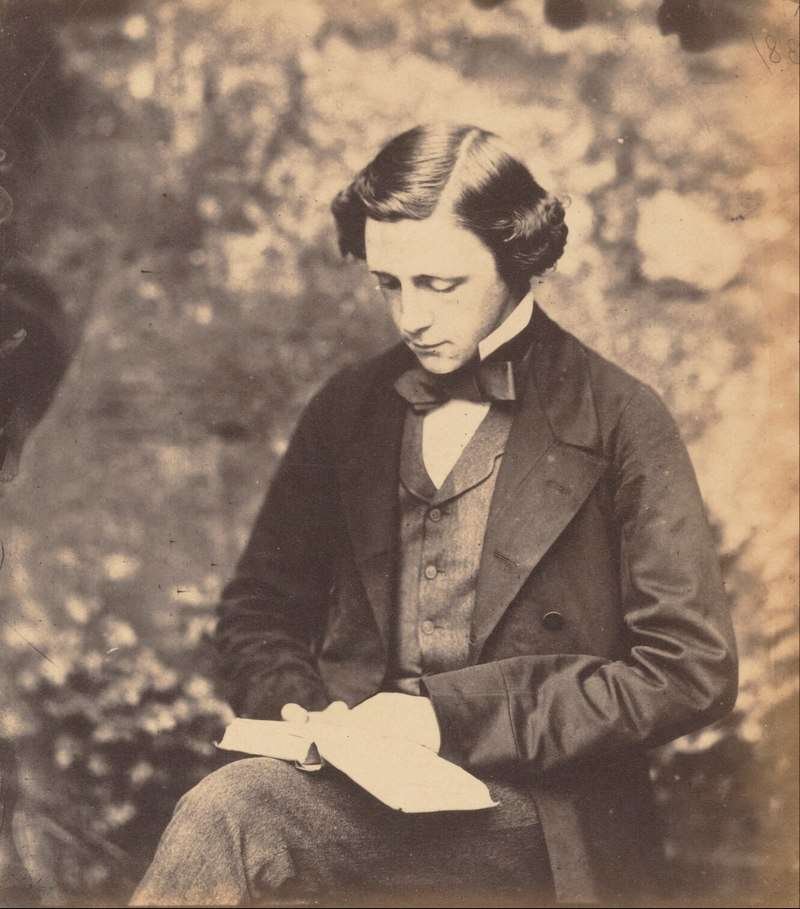
Lewis Carroll
Lewis Carroll’s real name was Charles Lutwidge Dodson (1832-1898). He was a scholar, professor, mathematician, writer, poet, and photographer, noted for his brilliant facility in making riddles, puzzles, wordplay, and logical paradoxes. Carroll wrote numerous poems, songs, novels, an opera, mathematical textbooks, and essays on writing, science, and philosophy. He taught mathematics at Christ Church College at Oxford University.
Alice In Wonderland was published in 1865. In the story Alice falls down a hole chasing the White Rabbit. She arrives in a magical world, experiences bizarre situations, and gets in trouble with the Queen of Hearts who orders “off with her head.” At the end Alice awakens from a dream. Wonderland main characters include: Caterpillar, Cheshire Cat, White Rabbit, Duchess, Mad Hatter, March Hare, Dormouse, Queen of Hearts, King of Hearts, Gryphon, and Mock Turtle.
Through the Looking Glass was published in 1871. Alice goes through a mirror into a magical world. Carroll wrote the story as a chess game and the characters are chess pieces. Alice awakens to find herself back home and speculates that the tale was all a dream of the Red King – is life but a dream? Looking Glass characters include: Humpty Dumpty, White Knight, March Hare, Mad Hatter, Tweedledum, Tweedledee, White King, White Queen, Red Queen, Red King, Walrus, Carpenter, and others.
Some Great Lewis Carroll Quotes
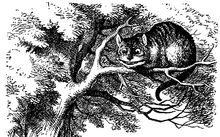
“Imagination is the only weapon in the war with reality.”
“I can’t go back to yesterday – because I was a different person then.”
“If you do not know where you want to go, it doesn’t matter which path you take.”
“You’re entirely bonkers. But I’ll tell you a secret… All the best people are!”
“You have to run as fast as you can just to stay where you are. If you want to get anywhere, you’ll have to run much faster.”
“But, I nearly forgot, you must close your eyes otherwise you won’t see anything.”
“We’re all mad here. You must be mad, or you wouldn’t be here.”
“A dream is not reality but who’s to say which is which?”
″‘I only wish I had such eyes,’ the King remarked in a fretful tone. ‘To be able to see Nobody! And at that distance too! Why, it’s as much as I can do to see real people, by this light!‘”
“Things are curiouser and curiouser”
“I am not crazy; my reality is just different from yours.”
“If I had a world of my own, everything would be nonsense. Nothing would be what it is, because everything would be what it isn’t. And contrary wise, what is, it wouldn’t be. And what it wouldn’t be, it would. You see?”
“Take some more tea,” the March Hare said to Alice, very earnestly. “I’ve had nothing yet,” Alice replied in an offended tone: “so I can’t take more.” “You mean you can’t take less,” said the Hatter: “It’s very easy to take more than nothing.”
Jabberwocky
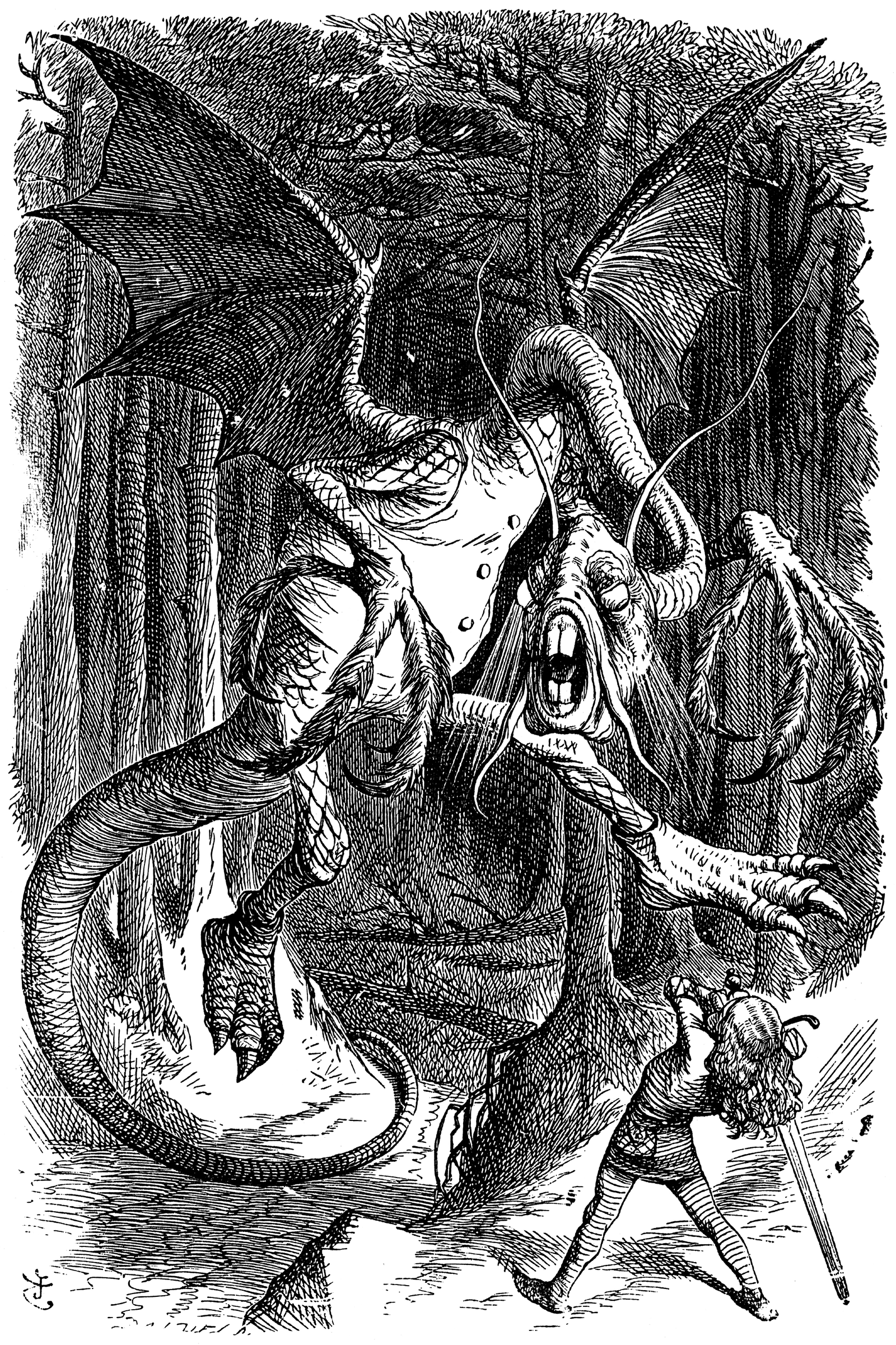
Jabberwocky
from Through the Looking Glass
’Twas brillig, and the slithy toves
Did gyre and gimble in the wabe:
All mimsy were the borogoves,
And the mome raths outgrabe.
“Beware the Jabberwock, my son!
The jaws that bite, the claws that catch!
Beware the Jubjub bird, and shun
The frumious Bandersnatch!”
He took his vorpal sword in hand;
Long time the manxome foe he sought—
So rested he by the Tumtum tree
And stood awhile in thought.
And, as in uffish thought he stood,
The Jabberwock, with eyes of flame,
Came whiffling through the tulgey wood,
And burbled as it came!
One, two! One, two! And through and through
The vorpal blade went snicker-snack!
He left it dead, and with its head
He went galumphing back.
“And hast thou slain the Jabberwock?
Come to my arms, my beamish boy!
O frabjous day! Callooh! Callay!”
He chortled in his joy.
’Twas brillig, and the slithy toves
Did gyre and gimble in the wabe:
All mimsy were the borogoves,
And the mome raths outgrabe.
Life Is But a Dream
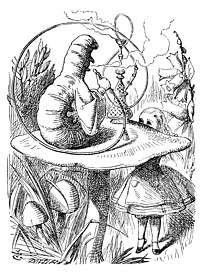
Life Is But A Dream
from Through the Looking Glass
A boat, beneath a sunny sky
Lingering onward dreamily
In an evening of July
Children three that nestle near,
Eager eye and willing ear,
Pleased a simple tale to hear
Long has paled that sunny sky;
Echoes fade and memories die;
Autumn frosts have slain July.
Still she haunts me, phantomwise,
Alice moving under skies
Never seen by waking eyes.
Children yet, the tale to hear,
Eager eye and willing ear,
Lovingly shall nestle near.
In a Wonderland they lie,
Dreaming as the days go by,
Dreaming as the summers die;
Ever drifting down the stream
Lingering in the golden gleam
Life, what is it but a dream?
You Are Old Father William
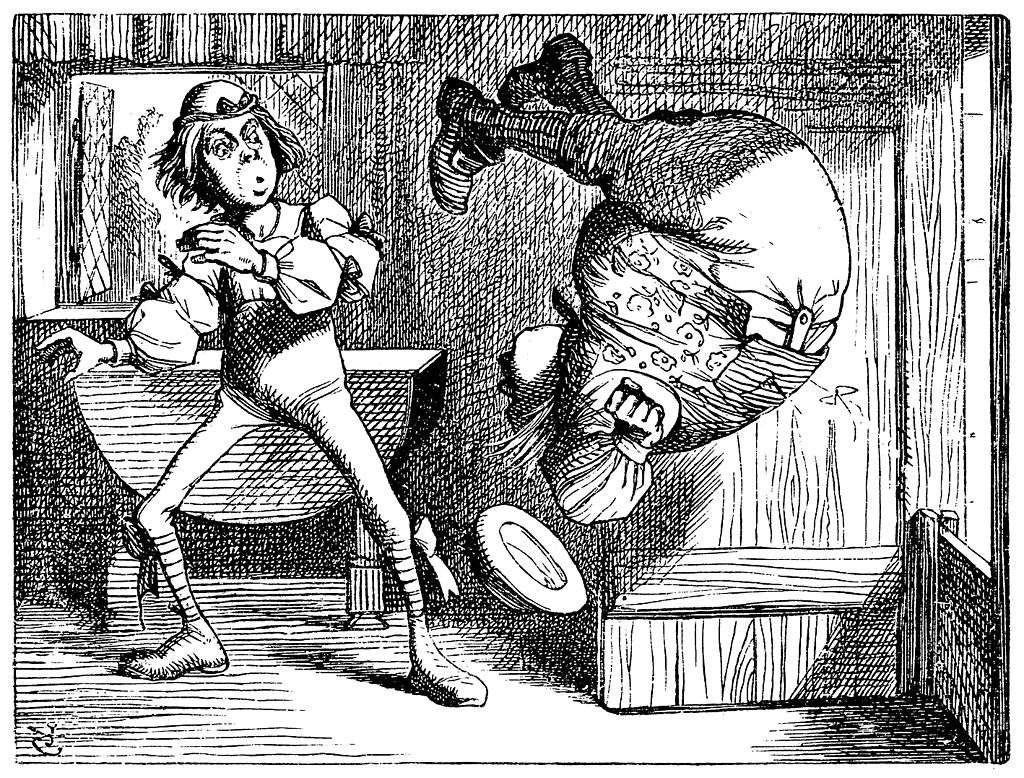
You Are Old Father William
from Alice In Wonderland
“You are old, father William,” the young man said,
“And your hair has become very white;
And yet you incessantly stand on your head —
Do you think, at your age, it is right?
“In my youth,” father William replied to his son,
“I feared it might injure the brain;
But, now that I’m perfectly sure I have none,
Why, I do it again and again.”
“You are old,” said the youth, “as I mentioned before,
And you have grown most uncommonly fat;
Yet you turned a back-somersault in at the door —
Pray what is the reason for that?”
“In my youth,” said the sage, as he shook his grey locks,
“I kept all my limbs very supple
By the use of this ointment — one shilling a box —
Allow me to sell you a couple?”
“You are old,” said the youth, “and your jaws are too weak
For anything tougher than suet;
Yet you finished the goose, with the bones and the beak —
Pray, how did you mange to do it?”
“In my youth,” said his fater, “I took to the law,
And argued each case with my wife;
And the muscular strength, which it gave to my jaw,
Has lasted the rest of my life.”
“You are old,” said the youth, “one would hardly suppose
That your eye was as steady as every;
Yet you balanced an eel on the tend of your nose —
What made you so awfully clever?”
“I have answered three questions, and that is enough,”
Said his father. “Don’t give yourself airs!
Do you think I can listen all day to such stuff?
Be off, or I’ll kick you down stairs.
Epilogue To Through The Looking Glass
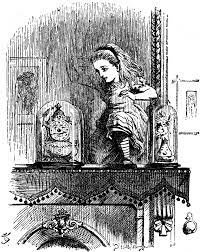
Epilogue To Through The Looking Glass
A boat, beneath a sunny sky
Lingering onward dreamily
In an evening of July —
Children three that nestle near,
Eager eye and willing ear
Pleased a simple tale to hear —
Long has paled that sunny sky:
Echoes fade and memories die:
Autumn frosts have slain July.
Still she haunts me, phantomwise
Alice moving under skies
Never seen by waking eyes.
Children yet, the tale to hear,
Eager eye and willing ear,
Lovingly shall nestle near.
In a Wonderland they lie,
Dreaming as the days go by,
Dreaming as the summers die:
Ever drifting down the stream —
Lingering in the golden gleam —
Life what is it but a dream?
Alice and the White Knight
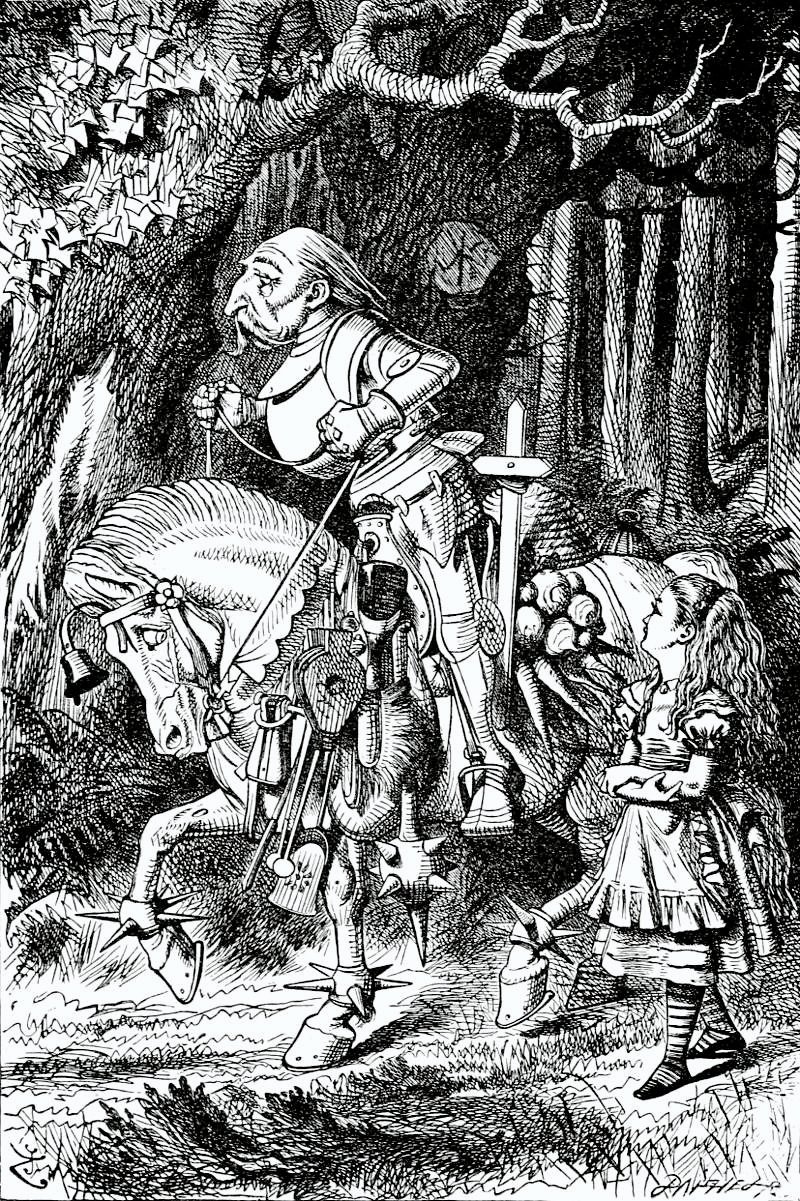
Alice and the White Knight
from Through the Looking Glass
I’ll tell thee everything I can;
There’s little to relate.
I saw an aged, aged man,
A-sitting on a gate.
‘Who are you, aged man?’ I said,
‘ And how is it you live?’
And his answer trickled through my head
like water through a sieve.
He said ‘I look for butterflies
That sleep among the wheat:
I make them into mutton pies,
And sell them in the street.
I sell them unto men,’ he said,
‘Who sail on stormy seas;
And that’s the way I get my bread –
A trifle if you please.’
But I was thinking of a plan
To dye one’s whiskers green,
And always use so large a fan
That they could not be seen.
So, having no reply to give
To what the old man said,
I cried, ‘Come tell me how you live!’
And thumped him on the head.
His accents mild took up the tale:
He said, ‘I go my ways,
And when I find a mountain-rill,
I set it in a blaze;
And thence they make a stuff they call
Rowland’s Macassar Oil –
Yet twopence-halfpenny is all
They give me for my toil.’
But I was thinking of a way
To feed one’s self on batter,
And so go on from day to day
Getting a little fatter.
I shook him well from side to side
Until his face was blue:
‘Come tell me how you live,’ I cried,
‘And what it is you do!’
He said ‘I hunt for haddocks’ eyes
Among the heather bright,
And work them into waistcoat buttons
In the silent night.
And these I do not sell for gold
Or coin of silvery shine,
But for a copper halfpenny,
And that will purchase nine.
‘I sometimes dig for buttered rolls,
Or set limed twigs for crabs;
I sometimes search for grassy knolls
For wheels of hansom-cabs.
And that’s the way’ (he gave a wink)
‘By which I get my wealth –
And very gladly will I drink
Your Honour’s noble health.’
I heard him then, for I had just
Completed my design
To keep the Menai Bridge from rust
By boiling it in wine.
I thanked him much for telling me
The way he got his wealth,
But chiefly for the wish that he
Might drink my noble health.
And now if e’er by chance I put
My fingers into glue,
Or madly squeeze a right-hand foot
Into a left-hand shoe,
Or if I drop upon my toe
A very heavy weight,
I weep, for it reminds me so
Of that old man I used to know –
Whose look was mild, whose speech was slow
Whose hair was whiter than the snow,
Whose face was very like a crow,
With eyes, like cinders, all aglow,
Who seemed distracted with his woe,
Who rocked his body to and fro,
And muttered mumblingly and low,
As if his mouth were full of dough,
Who snorted like a buffalo –
That summer evening long ago
A-sitting on a gate.
Dreamland
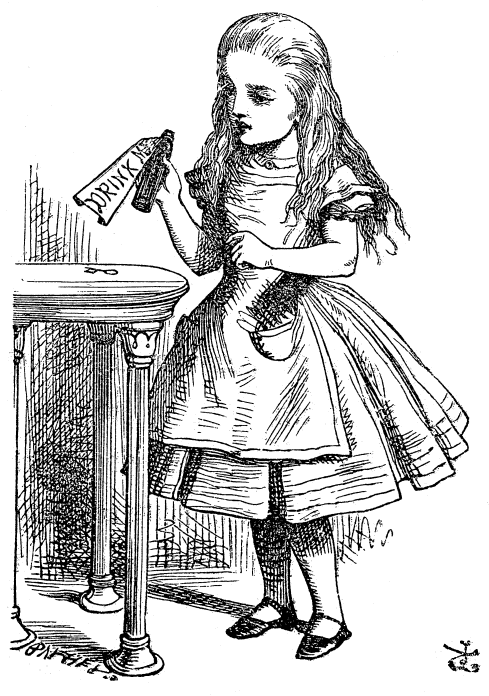
Dreamland
When midnight mists are creeping,
And all the land is sleeping,
Around me tread the mighty dead,
And slowly pass away.
Lo, warriors, saints, and sages,
From out the vanished ages,
With solemn pace and reverend face
Appear and pass away.
The blaze of noonday splendour,
The twilight soft and tender,
May charm the eye: yet they shall die,
Shall die and pass away.
But here, in Dreamland’s centre,
No spoiler’s hand may enter,
These visions fair, this radiance rare,
Shall never pass away.
I see the shadows falling,
The forms of old recalling;
Around me tread the mighty dead,
And slowly pass away.
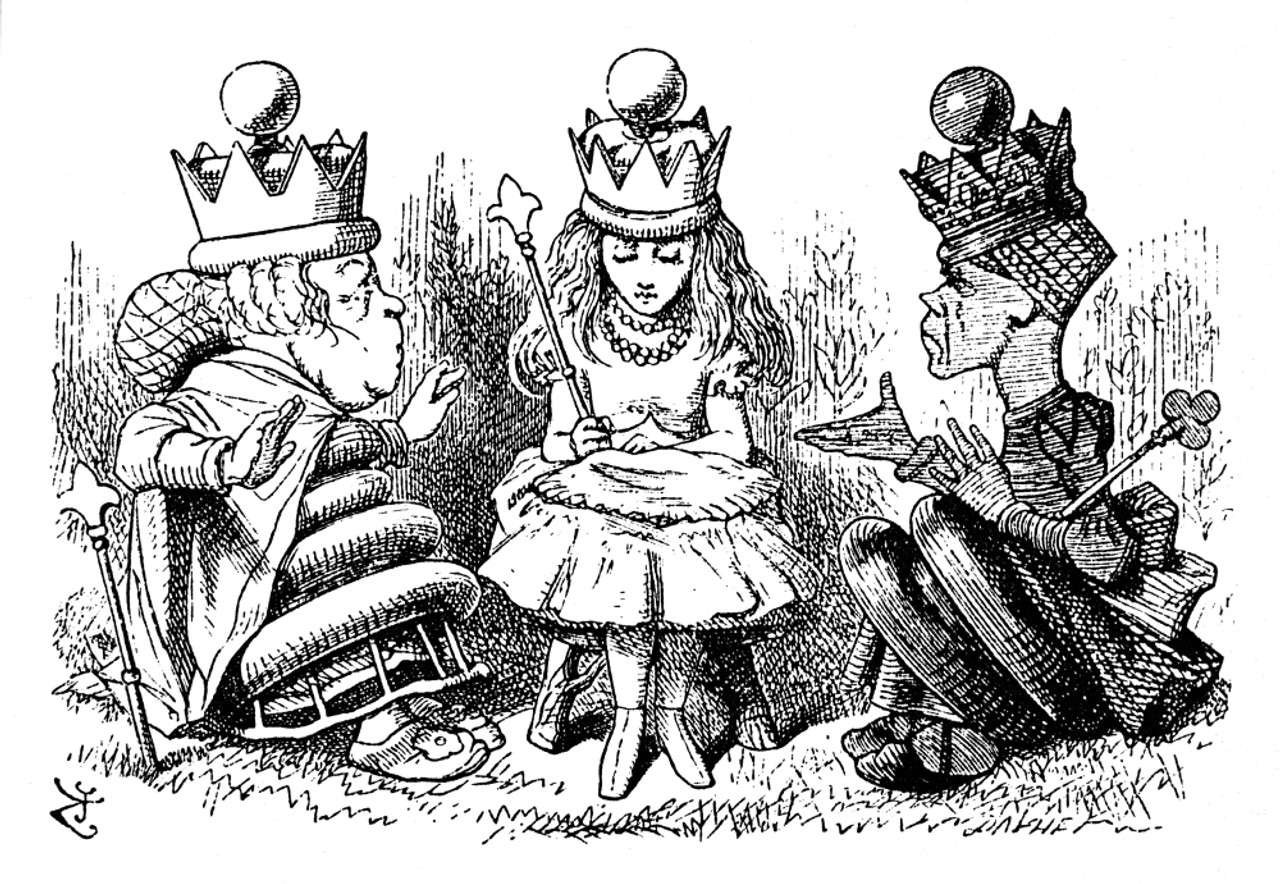
How Doth the Little Crocodile
from Alice In Wonderland
How doth the little crocodile
Improve his shining tail,
And pour the waters of the Nile
On every golden scale!
How cheerfully he seems to grin
How neatly spreads his claws,
And welcomes little fishes in,
With gently smiling jaws!
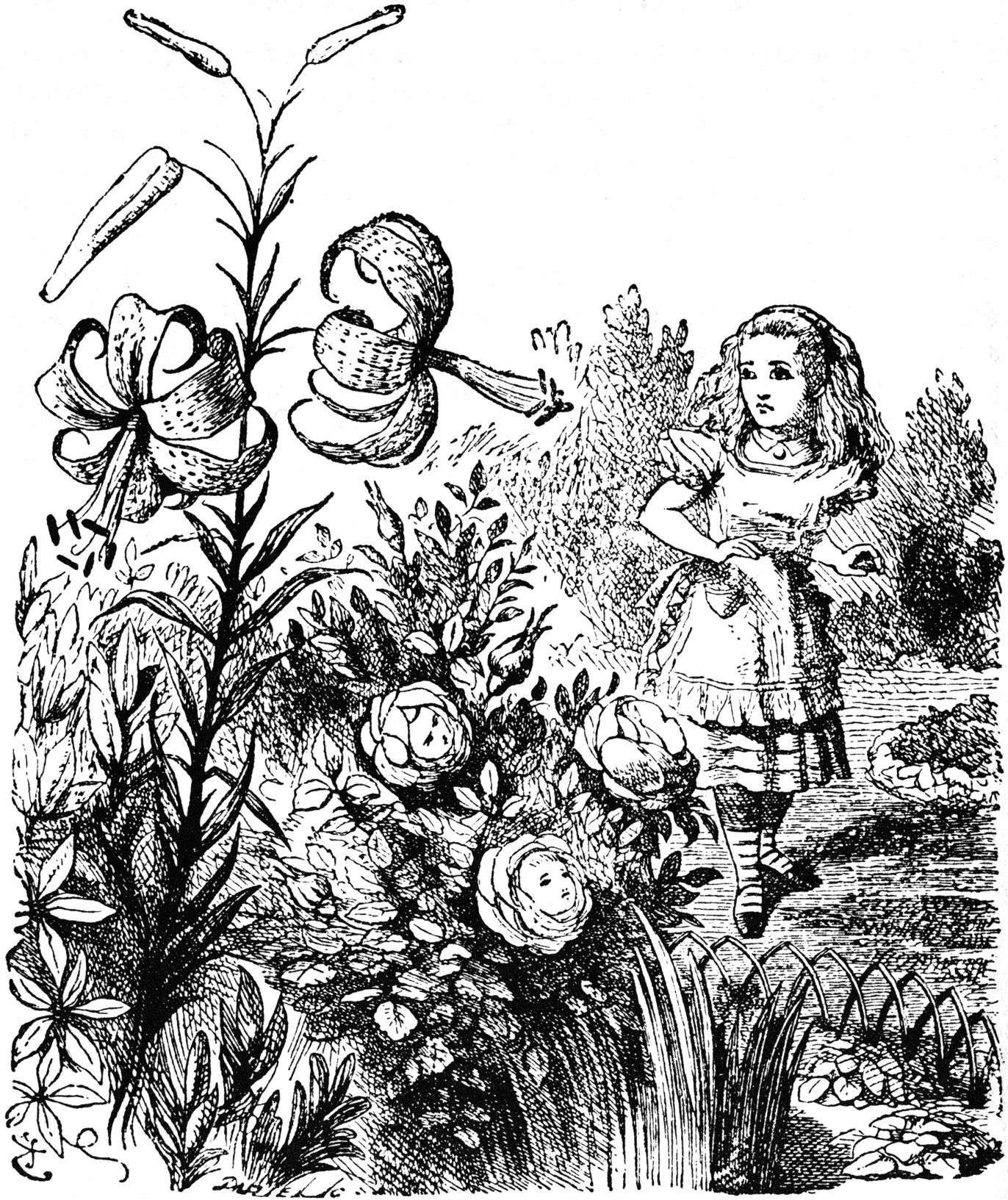
The Mad Gardener’s Song
He thought he saw an Elephant,
That practised on a fife:
He looked again, and found it was
A letter from his wife.
‘At length I realise,’ he said,
The bitterness of Life!’
He thought he saw a Buffalo
Upon the chimney-piece:
He looked again, and found it was
His Sister’s Husband’s Niece.
‘Unless you leave this house,’ he said,
‘I’ll send for the Police!’
He thought he saw a Rattlesnake
That questioned him in Greek:
He looked again, and found it was
The Middle of Next Week.
‘The one thing I regret,’ he said,
‘Is that it cannot speak!’
He thought he saw a Banker’s Clerk
Descending from the bus:
He looked again, and found it was
A Hippopotamus.
‘If this should stay to dine,’ he said,
‘There won’t be much for us!’
He thought he saw a Kangaroo
That worked a coffee-mill:
He looked again, and found it was
A Vegetable-Pill.
‘Were I to swallow this,’ he said,
‘I should be very ill!’
He thought he saw a Coach-and-Four
That stood beside his bed:
He looked again, and found it was
A Bear without a Head.
‘Poor thing,’ he said, ‘poor silly thing!
It’s waiting to be fed!’
He thought he saw an Albatross
That fluttered round the lamp:
He looked again, and found it was
A Penny-Postage Stamp.
‘You’d best be getting home,’ he said:
‘The nights are very damp!’
He thought he saw a Garden-Door
That opened with a key:
He looked again, and found it was
A Double Rule of Three:
‘And all its mystery,’ he said,
‘Is clear as day to me!’
He thought he saw a Argument
That proved he was the Pope:
He looked again, and found it was
A Bar of Mottled Soap.
‘A fact so dread,’ he faintly said,
‘Extinguishes all hope!’
The Voice of the Lobster
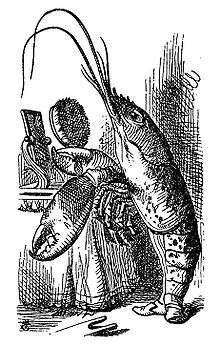
The Voice of the Lobster
from Alice In Wonderland
”Tis the voice of the Lobster: I heard him declare
‘You have baked me too brown, I must sugar my hair.’
As a duck with its eyelids, so he with his nose
Trims his belt and his buttons, and turns out his toes.
When the sands are all dry, he is gay as a lark,
And will talk in contemptuous tones of the Shark:
But, when the tide rises and sharks are around,
His voice has a timid and tremulous sound.’
‘I passed by his garden, and marked, with one eye,
How the Owl and the Panter were sharing a pie:
The Panther took pie-crust, and gravy, and meat,
While the Old had the dish as its share of the treat.
When the pie was all finished, the Owl, as a boon,
Was kindly permitted to pocket the spoon:
While the Panther received knife and fork with a growl,
And concluded the banquet by [eating the owl.]
The Mock Turtle’s Song
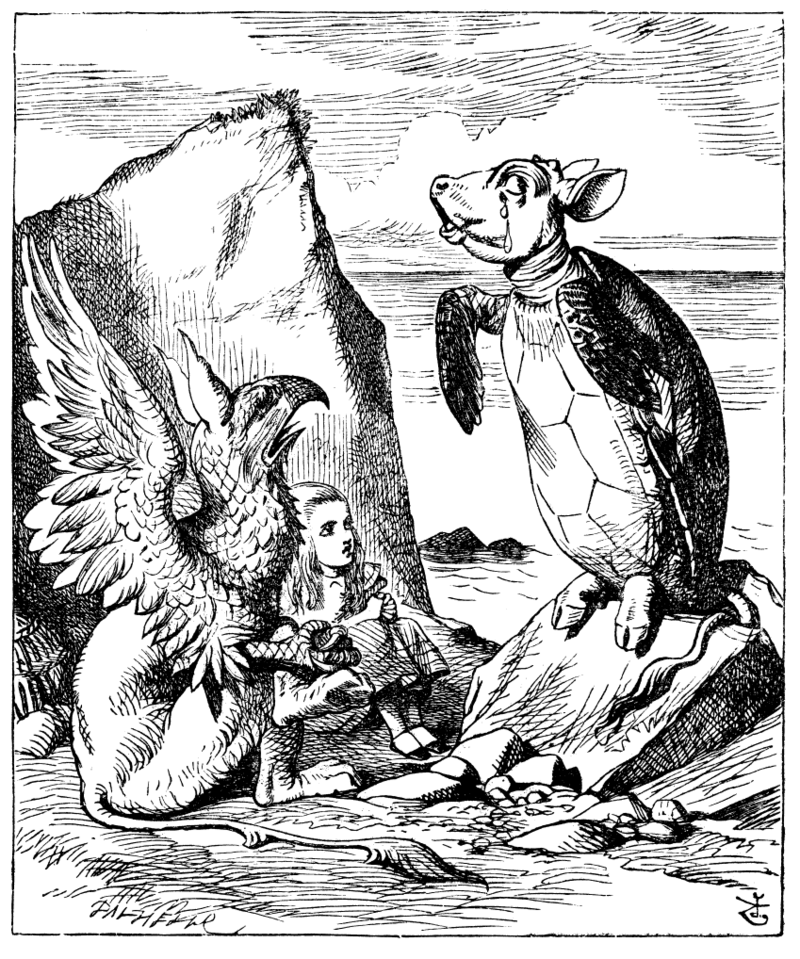
The Mock Turtle’s Song
from Alice In Wonderland
‘Will you walk a little faster?’ said a whiting to a snail,
‘There’s a porpoise close behind us, and he’s treading on my tail.
See how eagerly the lobsters and the turtles all advance!
They are waiting on the shingle — will you come and join the dance?
Will you, won’t you, will you, won’t you, will you join the dance?
Will you, won’t you, will you, won’t you, won’t you join the dance?
‘You can really have no notion how delightful it will be
When they take us up and throw us, with the lobsters, out to sea!’
But the snail replied ‘Too far, too far!’ and gave a look askance —
Said he thanked the whiting kindly, but he would not join the dance.
Would not, could not, would not, could not, would not join the dance.
Would not, could not, would not, could not, could not join the dance.
‘What matters it how far we go?’ his scaly friend replied.
‘There is another shore, you know, upon the other side.
The further off from England the nearer is to France —
Then turn not pale, beloved snail, but come and join the dance.
Will you, won’t you, will you, won’t you, will you join the dance?
Will you, won’t you, will you, won’t you, won’t you joint the dance?
Humpty Dumpty’ s Song
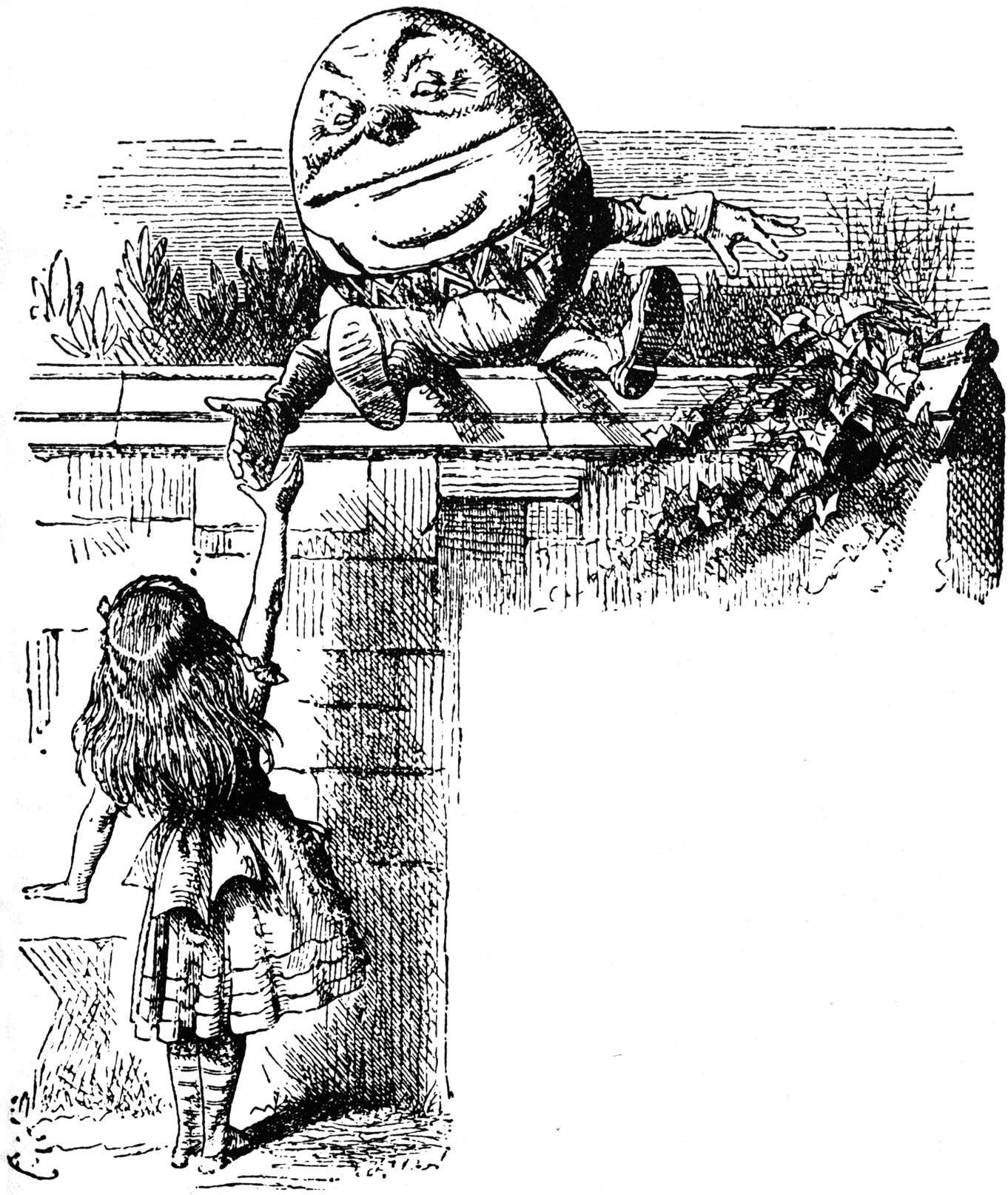
Humpty Dumpty’ Song
from Through the Looking Glass
In winter, when the fields are white,
I sing this song for your delight.
In Spring, when woods are getting green,
I’ll try and tell you what I mean.
In Summer, when the days are long,
Perhaps you’ll understand the song.
In Autumn, when the leaves are brown,
Take pen and ink, and write it down.
I sent a message to the fish:
I told them ‘This is what I wish.’
The little fishes of the sea,
They sent an answer back to me.
The little fishes’ answer was
‘We cannot do it, Sir, because-‘
I sent to them again to say
‘It will be better to obey.’
The fishes answered, with a grin,
‘Why, what a temper you are in!’
I told them once, I told them twice:
They would not listen to advice.
I took a kettle large and new,
Fit for the deed I had to do.
My heart went hop, my heart went thump:
I filled the kettle at the pump.
Then someone came to me and said
‘The little fishes are in bed.’
I said to him, I said it plain,
‘Then you must wake them up again.’
I said it very loud and clear:
I went and shouted in his ear.
But he was very stiff and proud:
He said ‘You needn’t shout so loud!’
And he was very proud and stiff:
He said ‘I’d go and wake them, if-‘
I took a corkscrew from the shelf:
I went to wake them up myself.
And when I found the door was locked,
I pulled and pushed and kicked and knocked.
And when I found the door was shut,
I tried to turn the handle, but-
There was a long pause.
‘Is that all?’ Alice timidly asked.
‘That’s all,’ said Humpty Dumpty. ‘Good-bye.’
The Walrus and the Carpenter
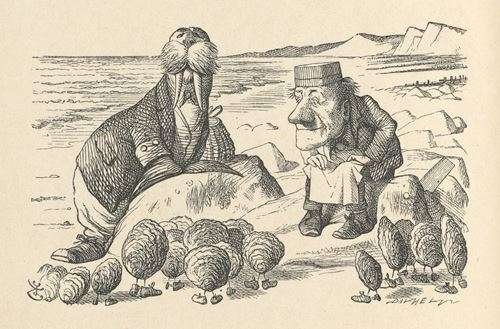
The Walrus and the Carpenter
from Through the Looking Glass
The sun was shining on the sea,
Shining with all his might:
He did his very best to make
The billows smooth and bright —
And this was odd, because it was
The middle of the night.
The moon was shining sulkily,
Because she thought the sun
Had got no business to be there
After the day was done —
‘It’s very rude of him.’ she said,
‘To come and spoil the fun!’
The sea was wet as wet could be,
The sands were dry as dry.
You could not see a cloud, because
No cloud was in the sky:
No birds were flying overhead —
There were no birds to fly.
The Walrus and the Carpenter
Were walking close at hand:
They wept like anything to see
Such quantities of sand:
‘If this were only cleared away,’
They said, ‘it would be grand.’
‘If seven maids with seven mops
Swept it for half a year,
Do you suppose,’ the Walrus said,
‘That they could get it clear?’
‘l doubt it,’ said the Carpenter,
And shed a bitter tear.
‘O Oysters, come and walk with us!
The Walrus did beseech.
‘A pleasant walk, a pleasant talk,
Along the briny beach:
We cannot do with more than four,
To give a hand to each.’
The eldest Oyster looked at him,
But never a word he said:
The eldest Oyster winked his eye,
And shook his heavy head —
Meaning to say he did not choose
To leave the oyster-bed.
Out four young Oysters hurried up.
All eager for the treat:
Their coats were brushed, their faces washed,
Their shoes were clean and neat —
And this was odd, because, you know,
They hadn’t any feet.
Four other Oysters followed them,
And yet another four;
And thick and fast they came at last,
And more, and more, and more —
All hopping through the frothy waves,
And scrambling to the shore.
The Walrus and the Carpenter
Walked on a mile or so,
And then they rested on a rock
Conveniently low:
And all the little Oysters stood
And waited in a row.
‘The time has come,’ the Walrus said,
‘To talk of many things:
Of shoes — and ships — and sealing wax —
Of cabbages — and kings —
And why the sea is boiling hot —
And whether pigs have wings.’
‘But wait a bit,’ the Oysters cried,
‘Before we have our chat;
For some of us are out of breath,
And all of us are fat!’
‘No hurry!’ said the Carpenter.
They thanked him much for that.
‘A loaf of bread,’ the Walrus said,
‘Is what we chiefly need:
Pepper and vinegar besides
Are very good indeed —
Now, if you’re ready, Oysters dear,
We can begin to feed.’
‘But not on us!’ the Oysters cried,
Turning a little blue.
‘After such kindness, that would be
A dismal thing to do!’
‘The night is fine,’ the Walrus said,
‘Do you admire the view?’
‘It was so kind of you to come!
And you are very nice!’
The Carpenter said nothing but
‘Cut us another slice-
I wish you were not quite so deaf-
I’ve had to ask you twice!’
‘It seems a shame,’ the Walrus said,
‘To play them such a trick.
After we’ve brought them out so far,
And made them trot so quick!’
The Carpenter said nothing but
‘The butter’s spread too thick!’
‘I weep for you,’the Walrus said:
‘I deeply sympathize.’
With sobs and tears he sorted out
Those of the largest size,
Holding his pocket-handkerchief
Before his streaming eyes.
‘O Oysters,’ said the Carpenter,
‘You’ve had a pleasant run!
Shall we be trotting home again?’
But answer came there none —
And this was scarcely odd, because
They’d eaten every one.
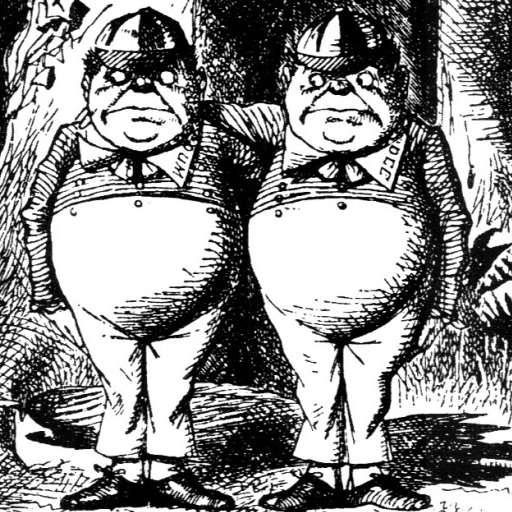
References
azquotes
brainyquote
goodreads
Poetry Foundation
Poetry Hunter
Wikipedia
The Annointed Alice, Martin Gardner, Bramhall, NY, 1960.



